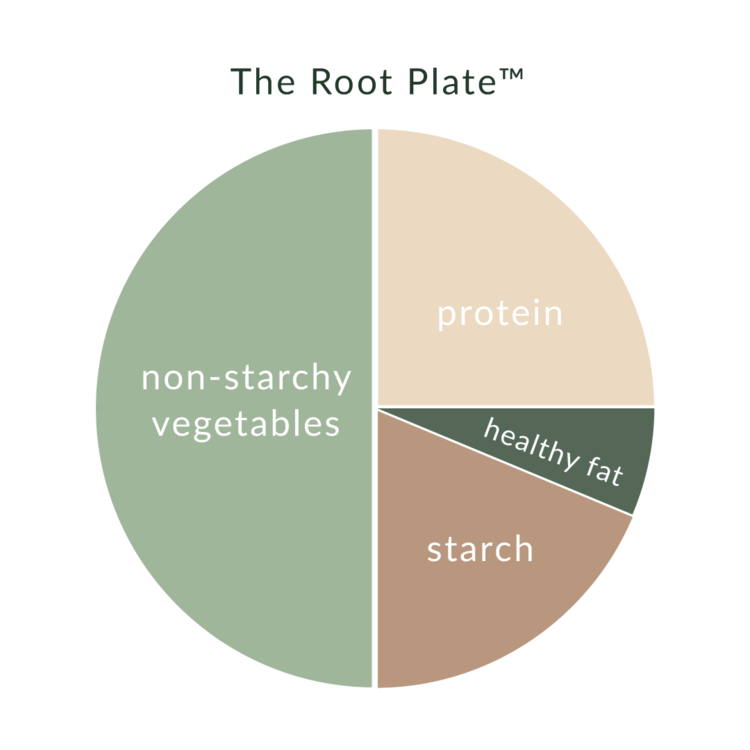
Why am I not losing weight?
Difficulty losing weight is the number one concern we hear from most of the women we work with. You may have tried everything under the sun. You also may have heard from a conventional doctor that your weight is the cause of symptoms you are experiencing. They may instruct you to lose weight (as if you haven’t already tried) and send you on your way. We understand this is incredibly frustrating and discouraging.
In this article, we will review a few possible reasons why you may have difficulty losing weight.
Insulin Resistance
Insulin is a hormone responsible for controlling blood sugar levels. When your cells become resistant to insulin, your body releases even more insulin and blood sugar levels remain abnormally elevated. If you have insulin resistance, you may experience frequent sugar cravings, fatigue after meals, weight gain or difficulty losing weight, and constant hunger. Insulin resistance is very common in conditions like polycystic ovary syndrome (PCOS).
The food you eat plays a major role in treating insulin resistance. But, more importantly, meal planning must be carried out correctly to balance blood sugar levels to encourage weight loss. We talk in depth about our PFC Balance Method, which we actually trademarked "The Root Plate™" in many of our articles and courses. PFC is a simple formula that ensures you have protein, fat, and fiber-rich carbohydrates with each meal and snack. This formula has helped numerous women lose weight, normalize blood sugar levels, achieve regular periods, and more.
There are also certain supplements that can help insulin resistance.
There are also certain supplements that can help insulin resistance.
We love Root Metabolism Support because it contains Berberine and ALA , which activate adenosine mono-phosphate kinase (AMPK), the master metabolic switch, which can improve metabolism, insulin sensitivity, and boost mitochondrial function.
Stress
High stress levels can lead to difficulty losing weight by increasing a stress hormone called cortisol. Cortisol is released from the adrenal glands directly above your kidneys and is required in appropriate amounts for every day functions. However, the demands of modern day lifestyles often cause cortisol to stay elevated for longer periods of time. Too much cortisol can cause weight gain or difficulty losing weight, hormone imbalances, and insomnia. To lower cortisol levels, implement at least one stress management technique you will maintain on a regular basis. We often recommend meditation, box breathing, yoga, nature walks, or journaling. We may also use adaptogens, like Ashwagandha, to support healthy cortisol levels as well.
Poor Sleep
Sleep dysfunction can have devastating effects on your weight loss efforts. For example, sleeping less than six hours per night can worsen insulin resistance, increase inflammation, and cause an imbalance in your appetite hormones (1, 2, 3). In fact, sleep deprivation may cause an estimated 40 percent increase in sugar cravings, and studies show people will eat around 300 more calories when sleep deprived versus when they are well rested. A simple yet profound intervention you can start today is to aim for seven to eight hours of sleep every night. We often recommend magnesium to promote restful sleep.
Inflammation
Chronic inflammation occurs when your body’s response to injury lingers for a long period of time. Conditions like PCOS, Hashimoto’s thyroid disease, and other autoimmune conditions are often associated with low-grade, chronic inflammation (4). Underlying inflammation can hinder weight loss efforts. Nevertheless, we often see women successfully losing weight once we treat the root causes of inflammation. Treating inflammation, however, can be a tricky process. Following an anti-inflammatory diet is foundational in balancing blood sugar levels and providing your body with the nutrients it needs for optimal function. Aim to eat lots of colorful vegetables, fruits, nuts, and seeds. We also recommend eating fish rich in omega-3, like salmon, at least twice weekly. It’s essential to treat the root cause of your inflammation, whether it be insulin resistance, poor gut health, or environmental toxin exposure. Our functional medicine doctors at Root are trained to identify and treat all of these potential causes of inflammation.
Interestingly, nearly all of our members who do our MRT food sensitivity testing and food protocol based on results end up losing weight. We believe this weight loss effect is both part of reducing inflammation and eating single ingredient foods without inflammatory additives.
Fad Diets
Diet culture particularly targets women who suffer from ongoing health conditions and have difficulty losing weight. The “lose weight quick” programs often restrict or eliminate entire food groups or carbohydrates as a whole. Despite what you may lose initially, we find that individuals following these programs regain the weight and feel guilty or ashamed of their perceived “failure.” They may also feel preoccupied with food and cycle through periods of restriction followed by binging. Diet cycling is not your fault, and it is not due to lack of motivation or discipline. These diets are simply not sustainable.
In our practice, our doctors and dietitians work with women to treat the root causes of their health condition without strict dieting.
Oftentimes, these individuals end up losing weight as a side effect of addressing the root cause while also learning how to develop a healthy relationship with food.
Why am I not losing weight even though I have a calorie deficit?
Many of our members come to us already following a healthy diet, exercising, and tracking calories.
However, all too often, we hear one common question: if I’m eating less calories than my body requires, then why am I not losing weight? While calories do matter in the grand scheme of weight loss, they are not the only factor.
First of all, lower calories is not always better. Many women restrict their calorie intake too much. A strict calorie limit combined with too much exercise can cause irregular periods, worsen thyroid disorders, and make losing weight even more difficult. Plus, low-calorie food options are usually low in nutrients and do not satisfy hunger or support healthy blood sugar levels. Instead, prioritizing nutrient density, color, and diverse foods creates a foundation to support healthy and sustainable weight loss.
Key Takeaways
Underlying root causes, like insulin resistance, low-grade inflammation, high cortisol levels, and sleep dysfunction can all cause your body to hold on to extra weight. In our practice, we help women successfully lose weight while maintaining a healthy relationship with food by treating women’s hormones at the Root cause.

Get to the Root at Home
Curious about where you should start your functional medicine journey?
Take our Get to the Root Quiz so you can start working towards reversing disease and optimizing your health at the Root cause.
Take the Get to the Root Quiz
Related Articles

PCOS and Dairy
Women with polycystic ovary syndrome (PCOS) face many conflicting decisions on what foods to include or exclude in their meals and snacks each day. In this article, we’ll tackle the controversial topic of PCOS and dairy.

Hashimoto's Brain Fog
Learn about the link between Hashimoto's disease and brain fog, plus effective root cause interventions you can implement to alleviate symptoms.

